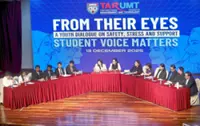PETALING JAYA: Exercise from a young age can prevent memory loss, cognitive decline and reduce the risk of developing Alzheimer’s and Parkinson’s disease in one’s later years, according to medical experts.
Dr Thiyagar Nadarajaw, a consultant paediatrician and adolescent medicine specialist, said during regular physical activity, the body released endorphins which can reduce stress, anxiety and depression.
“Physical exercise strengthens the brain structure and function, and also increases resilience. This in turn enhances behavioural and emotional self-regulation, hence reducing the risk of mental health problems.
“Self-esteem, interpersonal relations and self-confidence improve when children and teenagers participate in team sports.
ALSO READ: Ensuring kids maintain a physically active lifestyle
“Physical exercise makes them feel more relaxed at night and improves their sleep hygiene,” he told The Star.
Dr Thiyagar was responding to a Global State of Mind Study by Asics, a Japanese multinational corporation producing sportswear, which reaffirmed the positive link between physical activity and the mind and highlighting a direct link between exercise in teenage years and state of mind in adulthood.
The study surveyed over 26,000 people across 22 countries to explore the relationship between exercise and state of mind.
Asked about the young generation being hooked on gadgets, Dr Thiyagar said this could lead to health consequences like sleep disorder, vision problems, poor communication skills, attention deficit, poor cognition and creativity, neck pain and increased risk of obesity.
He said physically inactive children and teenagers might face poor physical, social, intellectual, emotional and mental health outcomes in adulthood.
“It can eventually cause significant morbidity and mortality in adulthood leading to reduced life expectancy.
“Parents have a vital role in preventing gadget addiction among their children and teenagers, while schools should advocate teenagers to participate in physical activities, especially team sports,” he said.
Clinical psychologist Dr Justine Thong Jian Ai said compared with previous generations, the mechanism of social interaction among adolescents today had been altered.
“Instead of interacting and socialising in-person, many spend more time alone on social media or other online platforms.
“This trend in turn impacts mental health and can exacerbate feelings of loneliness and isolation,” she said.
On parents’ role and advancement in technology contributing to the behaviour of children, she said this was not a blame game as it was challenging for caregivers to navigate a rapidly changing digital world.
At the same time, the advancement of technology was a fundamental part of the present day environment which could host multiple benefits and opportunities for teens, she added.
“Even social media and gaming could provide opportunities to access support networks and communities with shared interest.
“Caregivers could play roles in setting healthy structures and guidelines for Internet/gadget use as well as remain attentive and aware of the online lives of their children,” Dr Thong said.
Senior consultant physiotherapist Datuk BS Bains said encouraging sports among children could play a role in promoting good mental health.
“It’s always advisable for Gen Z to encourage any kind of regular sports, but not gym type exercises as they do put pressure on growing points of the joints system in teens. This could be a precautionary measure.
“Today’s young people are confined to sitting for many hours daily. They are getting into solitude. Interaction is getting scarce. This also contributes to mental health
“Additionally, considering other factors that could influence mental well-being, such as socioeconomic status and access to mental health resources, would provide a more comprehensive understanding of the relationship between exercise and mental health,” he said.
Bains said the government and respective councils take this step to ensure that green pockets are maintained for sports.
Across the globe, respondents who are regularly active have an average State of Mind score of 67/100, while inactive people had a much lower score of 54/100.
The score is calculated across 10 cognitive and emotional traits – positive, content, relaxed, focused, composed, resilient, confident, alert, calm and energised.
Malaysia ranked seventh with a 66 State of Mind Score, while China topped the list with 78, followed by Saudi Arabia and India (73 each), Thailand (71), Singapore (69) and Colombia (68).
The National Health and Morbidity Survey 2022: Adolescent Health Survey (NHMS 2022) revealed that only one out of five adolescents in Malaysia were physically active with two out of three adolescents practicing sedentary behaviour.
The NHMS 2022 also showed a rising prevalence of obesity, physical inactivity, sedentary behaviour, poor dietary choices and excessive consumption of carbonated soft drinks and fast food among Malaysian adolescents aged 13 to 17.





